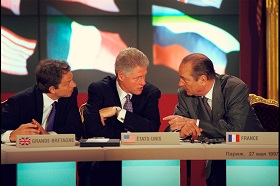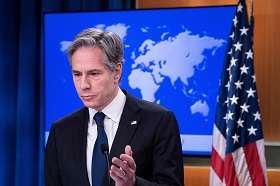If Russia is concerned about NATO’s military infrastructure, it should then focus on this rather than on a hypothesized NATO expansion. Let us not forget that the last NATO expansion took place 18 years ago, and there are no immediate plans to move on with this enlargement at present. However, there is nothing to prevent its military infrastructure from spreading across Europe even without formally accepting new members into the organization. On the other hand, if this is almost impossible for NATO to give Russia reliable legal guarantees to abandon its open-door policy to any nation that meets its criteria for membership, then Moscow could—and indeed must—insist on legally-binding guarantees that NATO’s military infrastructure will not be deployed close to Russian borders. There have been a number of instances in the years following the collapse of the Soviet Union when attempts to limit the geographical expansion of the NATO infrastructure in Europe have been successful.
Shifting the emphasis from counteracting NATO’s inchoate expansion plans to searching for concrete options to limit NATO’s military infrastructure in Europe should not be seen as Russia capitulating to the West. It is simply the most rational, and potentially most productive, response to the real threats to its security. Following Friday’s meeting of the Security Council of the Russian Federation, President Putin instructed its members to finalize a draft of the new concept of Russia’s foreign policy, taking the changes that have taken place in the world over the past five years into account. Let us hope that the updated version will reflect not only the emerging international changes, but also the opportunities that remain for finding mutually acceptable political compromises, including with Russia’s Western partners.
Once again, NATO’s possible advancement into the post-Soviet space has come to the fore in Russian expert discourse. The prospect of NATO expanding eastwards is often portrayed as an eschatological catastrophe, much alike the Mongol invasion of Russia in the middle of the 13th century. If this is indeed the case, this expansion must be precluded at all costs. Otherwise, Russia risks both a major geopolitical defeat and a loss of independence and political subjectivity, as it happened with the Russian principalities almost 800 years ago.
Psychology textbooks tell us that fear is a natural and even useful emotion, which is closely related to the instinct of self-preservation. However, human life, and state policy even more so, cannot be framed by emotions, especially negative—such as fear. As Marie Curie once rightly noted, “Nothing in life is to be feared, it is only to be understood.”
For your fears to be alleviated, you must demystify them. In other words, you need to rationalize your thoughts about the thing you are afraid of, pinpointing what exactly scares you and why. This principle of “taming” your fears can be applied to Russia’s current concerns about a possible NATO expansion.
Let’s say that Moscow fears Ukraine or Georgia becoming even more hostile towards Russia in case they become members of NATO. Okay, but you would be hard pushed to find anyone who would argue that Italy, a NATO member, has a worse opinion of Russia than Ukraine. Or that Moscow finds it more difficult to deal with NATO’s Greece than it can ever be with Georgia, which is still aspiring to the alliance. Traditionally, Russia’s diplomacy has had far more problems with the neutral Sweden rather than with the neighbouring Norway, a NATO member since the alliance’s foundation. Poland and Hungary joined NATO at the same time; however, the trajectories of Moscow’s interaction with Warsaw and Budapest have diverged greatly in recent years. All that allows us to assume that membership in NATO does not necessarily determine the nature of a country’s relations with Russia.
Perhaps, the main issue is that NATO’s expansion to the East would mean the expansion of its values and cultural norms as well as Western political models that are alien and unacceptable to Russia. This argument sounds rather unconvincing, though. For example, Turkey, which has long been a member of NATO, has been distancing itself from Western political standards for years now, critically revising the precepts of Kemal Atatürk and increasingly turning to the legacy of the Ottoman Empire. If we are talking about the liberal Western civilization invading the conservative “Russian world,” then Moscow should be far more afraid of a EU expansion than of a NATO expansion.
Apparently, we are talking about the very real fear of NATO moving its military infrastructure to Russia’s borders. Experts often note that a military presence in Ukraine will significantly reduce the flight time of U.S. cruise or ballistic missiles to Moscow. Of course, we could argue as much as we want about how much of a difference this would make: a hypothetical strike of U.S. sea- and air-based strategic missiles from the Black, Baltic and Barents seas, which are adjacent to Russia, would give Moscow only a few minutes more time to respond as compared to when a similar ground-based strike were launched from Kharkiv or Zaporizhia in Ukraine. But at least there is something of substance to talk about in this case.
If Russia is concerned about NATO’s military infrastructure, it should then focus on this rather than on a hypothesized NATO expansion. Let us not forget that the last NATO expansion took place 18 years ago, and there are no immediate plans to move on with this enlargement at present. However, there is nothing to prevent its military infrastructure from spreading across Europe even without formally accepting new members into the organization. On the other hand, if this is almost impossible for NATO to give Russia reliable legal guarantees to abandon its open-door policy to any nation that meets its criteria for membership, then Moscow could—and indeed must—insist on legally-binding guarantees that NATO’s military infrastructure will not be deployed close to Russian borders.
There have been a number of instances in the years following the collapse of the Soviet Union when attempts to limit the geographical expansion of the NATO infrastructure in Europe have been successful. The first precedent was set during the 1990 negotiations on the reunification of Germany. As we know, they were conducted in the 2+4 format (the two Germanies as one reunited country and four victorious great powers in World War II). It was agreed that NATO’s nuclear weapons, as well as foreign troops and other military infrastructure would not be deployed on the territory of the former East Germany, and that NATO military exercises would not be held there. This, despite the fact that East Germany automatically became a member of NATO upon reunification. Germany and NATO have respected this legally-binding agreement for over 30 years.
Another example of an agreement that limits the development of NATO’s military infrastructure is the Treaty on Conventional Armed Forces in Europe (CFE) signed in Paris in November 1990 (an amended version of the treaty was adopted in Istanbul nine years later). Significant restrictions were placed on the deployment of tanks, armoured combat vehicles, large-calibre artillery, aeroplanes and attack helicopters in Europe. The adapted version of the CFE Treaty was never ratified by the Western nations, although they de facto comply with its provisions for the most part. Obviously, we cannot return to the CFE Treaty in the current climate: the geopolitical situation in Europe has changed too much, and massive shifts have taken place in terms of equipping the armed forces of the sides (for example, drones – something that did not even cross the minds of the politicians drafting the treaty back in 1990 – are now widespread). That notwithstanding, the experience of the CFE Treaty retains its value, and one of the strategic tasks of Russian foreign policy moving forward could be to reach an agreement on the signing of a CFE 2 or similar document in the near future.
Shifting the emphasis from counteracting NATO’s inchoate expansion plans to searching for concrete options to limit NATO’s military infrastructure in Europe should not be seen as Russia capitulating to the West. It is simply the most rational, and potentially most productive, response to the real threats to its security. Following Friday’s meeting of the Security Council of the Russian Federation, President Putin instructed its members to finalize a draft of the new concept of Russia’s foreign policy, taking the changes that have taken place in the world over the past five years into account. Let us hope that the updated version will reflect not only the emerging international changes, but also the opportunities that remain for finding mutually acceptable political compromises, including with Russia’s Western partners.






